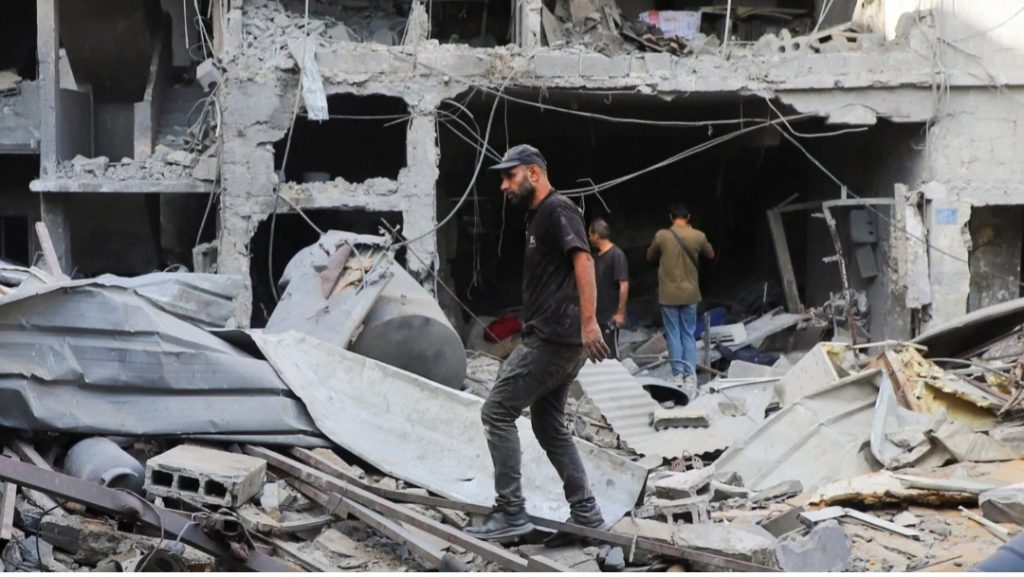
Crystal Dike
Indirect talks aimed at reaching a final agreement on a United States–brokered peace plan to end the Gaza war are set to continue Tuesday in the Egyptian resort city of Sharm El-Sheikh.
Palestinian and Egyptian officials told the BBC that the discussions are focused on “creating the field conditions” for a possible exchange that would see the release of all Israeli hostages in return for a number of Palestinian prisoners.
Israeli Prime Minister Benjamin Netanyahu said on Saturday that he hoped to announce the release of hostages “in the coming days.”
As officials met on Monday, U.S. President Donald Trump told reporters at the White House that “we have a really good chance of making a deal, and it’ll be a lasting deal.”
Hamas has said it agrees to parts of the peace plan but has yet to respond to several key demands, including its disarmament and exclusion from Gaza’s future governance. A senior Israeli security official said the initial stage of the talks would focus solely on the release of hostages, giving Hamas several days to complete that phase.
The second day of the negotiations — which will see Egyptian and Qatari mediators hold separate meetings with delegations from both Israel and Hamas — coincides with the second anniversary of the Hamas-led attack on southern Israel on October 7, 2023. That attack left about 1,200 people dead and 251 taken hostage.
Israel’s military campaign in Gaza, launched in response to the assault, has since killed 67,160 people, including 18,000 children, according to Gaza’s Hamas-run health ministry.
Marking the anniversary, UN Secretary-General António Guterres said Trump’s plan “presents an opportunity that must be seized to bring this tragic conflict to an end.” UK Prime Minister Sir Keir Starmer also expressed support for the initiative, saying London “welcomes the U.S. initiative towards peace in the Middle East” and would work to ensure both Israelis and Palestinians live “in safety and security.”
U.S. special envoy Steve Witkoff, Trump’s son-in-law Jared Kushner, and Qatari Foreign Minister Sheikh Mohammed bin Abdulrahman Al Thani are among those attending the talks.
Trump, in a social media post, urged participants to “move fast,” adding that he had been told the first phase — which includes the hostage release — “should be completed this week.”
“I really think we’re going to have a deal,” Trump told reporters Monday, adding that “Hamas has been agreeing to things that are very important.”
A Palestinian official told Reuters that the first day of talks ended late Monday and would resume Tuesday. Egypt’s state-affiliated Al-Qahera News also confirmed that discussions ended “amid a positive atmosphere.”
The 20-point peace plan, jointly developed by Trump and Netanyahu, calls for an immediate ceasefire and the release of 48 hostages — only 20 of whom are believed to be alive — in exchange for hundreds of Palestinian detainees. It also provides for the rapid delivery of humanitarian aid into Gaza once both sides agree to the terms.
Under the plan, Hamas would have no role in Gaza’s governance, though it leaves open the possibility of a future Palestinian state. However, Netanyahu reiterated his opposition to such a state on Friday, insisting, “It’s not written in the agreement. We said we would strongly oppose a Palestinian state.”
Hamas, in a statement on Friday, said it would release all Israeli prisoners “according to the exchange formula contained in Trump’s proposal” if the right conditions are met. It proposed that Gaza’s administration be handed to a “Palestinian body of independents (technocrats)” supported by Arab and Islamic nations, but made no mention of disarmament or its future political role.
The group’s tempered response — omitting its usual hardline “red lines” — has been interpreted by analysts as a sign of mounting external pressure.
European and Middle Eastern leaders have largely welcomed the U.S. proposal. The Palestinian Authority described Trump’s efforts as “sincere and determined,” while Iran, a longtime backer of Hamas, has also signaled support for the plan.
Meanwhile, Israeli bombardments continued in parts of Gaza on Monday ahead of the resumed talks. Gaza civil defence spokesman Mahmoud Basal told the BBC that “no aid trucks have been allowed into Gaza City since the offensive began four weeks ago,” and that “there are still bodies we cannot retrieve from areas under Israeli control.”
The Hamas-run health ministry said 21 Palestinians were killed and 96 others injured in the past 24 hours.
Israel has ordered mass evacuations from Gaza City to a “humanitarian area” in the south, but hundreds of thousands are believed to remain. Defence Minister Yoav Gallant has warned that those who stay “will be considered terrorists and supporters of terror.”
International journalists have been barred by Israel from independently entering Gaza since the start of the war, making independent verification of claims from both sides difficult.
